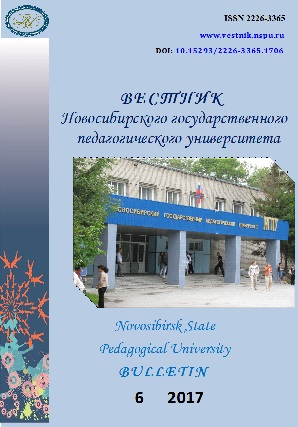Выбор карьеры детьми коренных народов Севера, учащихся в старших классах средней школы Республики Саха (Якутия)
Career choices made by middle and high schoolchildren with the main focus on representatives of indigenous peoples of the north in the Republic of Sakha (Yakutia)
Author(s): Ekaterina Andreevna Evseenko, Vladimir Igorevich Kirko, Ekaterina Valerevna Malakhova, Natalia Petrovna KoptsevaSubject(s): School education, Social development
Published by: Новосибирский государственный педагогический университет
Summary/Abstract: Introduction. The article presents a study of factors that determine the career choice of indigenous children – Evenks, high school students in secondary general schools located in extreme climatic and landscape zones on the territory of the Republic of Sakha (Yakutia). The purpose of the article is to identify the main factors affecting the choice of careers for children – representatives of indigenous small-numbered peoples of the North, Siberia and the Far East. Materials and Methods. The study was conducted on the basis of field work on the territory of the Republic of Sakha (Yakutia). The field research conducted on the territory of Arctic Region and the Republic of Sakha (Yakutia) resulted in an analysis of the factors defining the career choices made by the Evenk indigenous peoples' children, in particular, senior schoolchildren completing secondary general education in their respective territories located in extreme climatic and landscape zones. Results. These children's parents lead a traditional life with a traditional economy (hunting, migratory reindeer breeding, and fishing). The teachers’ school staff also resides in the Arctic Region territories under extreme conditions, thus, have a huge impact on the formation of images of success with senior school students. The 2016 field research resulted in approbation of methodology aimed at revealing the correlation between the senior students' career choice, their parents' opinions, and teachers' opinions. The methodology application will allow to identify whether there are parents' or teachers' impact on the career choices made by senior school students. Conclusions. The completed complex research proved there to be an increase in the territorial and economic educational differentiation of schoolchildren observed in post-Soviet Russia. The conditions for obtaining secondary education and the routine experience of schoolchildren from the Arctic indigenous peoples are insufficient for guarantying their free career choice and its compliance to the students’ own ideas about what a successful life contains. Political management established within the Arctic Region territories is subject to education inequality and should terminate the existing negative practices.
Journal: Вестник Новосибирского государственного педагогического университета
- Issue Year: 7/2017
- Issue No: 6
- Page Range: 7-25
- Page Count: 19
- Language: English

